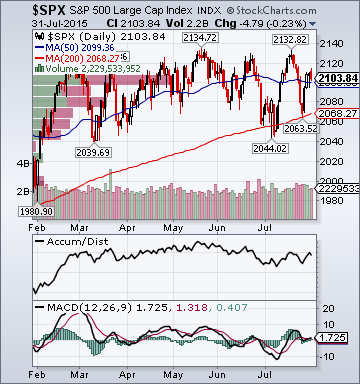Indices
- Russell 2000 1,238.68 +1.03%
- S&P 500 High Beta 32.16 +1.13%
- Goldman 50 Most Shorted 138.85 +.09%
- Wilshire 5000 21,965.0 +1.20%
- Russell 1000 Growth 1,024.55 +1.24%
- Russell 1000 Value 1,012.87 +1.17%
- S&P 500 Consumer Staples 515.20 +1.09%
- Solactive US Cyclical 128.73 +2.49%
- Morgan Stanley Technology 1,066.35 +1.06%
- Transports 8,391.96 +3.96%
- Bloomberg European Bank/Financial Services 120.42 -.11%
- MSCI Emerging Markets 37.13 +1.03%
- HFRX Equity Hedge 1,208.03 -.64%
- HFRX Equity Market Neutral 1,006.40 +.53%
Sentiment/Internals
- NYSE Cumulative A/D Line 233,613 +.95%
- Bloomberg New Highs-Lows Index -217 +286
- Bloomberg Crude Oil % Bulls 16.22 unch.
- CFTC Oil Net Speculative Position 234,419 -4.05%
- CFTC Oil Total Open Interest 1,694,436 +1.54%
- Total Put/Call 1.09 -21.58%
- OEX Put/Call 7.31 +609.71%
- ISE Sentiment 70.0 +7.69%
- Volatility(VIX) 12.12 -11.79%
- S&P 500 Implied Correlation 57.93 -2.59%
- G7 Currency Volatility (VXY) 9.31 -.85%
- Emerging Markets Currency Volatility (EM-VXY) 9.36 +2.52%
- Smart Money Flow Index 16,914.95 +.87%
- ICI Money Mkt Mutual Fund Assets $2.648 Trillion -.02%
- ICI US Equity Weekly Net New Cash Flow -$3.201 Billion
Futures Spot Prices
- Reformulated Gasoline 184.10 +.63%
- Heating Oil 158.40 -2.98%
- Bloomberg Base Metals Index 151.72 +.01%
- US No. 1 Heavy Melt Scrap Steel 236.67 USD/Ton -4.28%
- China Iron Ore Spot 53.41 USD/Ton +3.87%
- UBS-Bloomberg Agriculture 1,055.92 -2.32%
Economy
- ECRI Weekly Leading Economic Index Growth Rate .2% -10.0 basis points
- Philly Fed ADS Real-Time Business Conditions Index .1217 +8.18%
- S&P 500 Blended Forward 12 Months Mean EPS Estimate 126.09 +.16%
- Citi US Economic Surprise Index -15.4 -1.0 point
- Citi Eurozone Economic Surprise Index 7.1 +12.7 points
- Citi Emerging Markets Economic Surprise Index -11.4 +3.1 points
- Fed Fund Futures imply 62.0% chance of no change, 38.0% chance of 25 basis point hike on 9/17
- # of Months to 1st Fed Rate Hike(Morgan Stanley) 4.76 -7.93%
- US Dollar Index 97.24 +.03%
- Euro/Yen Carry Return Index 142.19 +.04%
- Yield Curve 152.0 -6.0 basis points
- 10-Year US Treasury Yield 2.19% -7.0 basis points
- Federal Reserve's Balance Sheet $4.447 Trillion -.34%
- U.S. Sovereign Debt Credit Default Swap 16.16 +4.30%
- Illinois Municipal Debt Credit Default Swap 237.0 +1.31%
- Western Europe Sovereign Debt Credit Default Swap Index 22.39 +1.40%
- Asia Pacific Sovereign Debt Credit Default Swap Index 62.94 +2.44%
- Emerging Markets Sovereign Debt CDS Index 293.35 -1.18%
- Israel Sovereign Debt Credit Default Swap 64.06 -2.19%
- Iraq Sovereign Debt Credit Default Swap 676.49 -6.07%
- Russia Sovereign Debt Credit Default Swap 337.27 +.85%
- iBoxx Offshore RMB China Corporates High Yield Index 121.1 +.40%
- 10-Year TIPS Spread 1.74% -2.0 basis points
- TED Spread 24.0 -2.5 basis points
- 2-Year Swap Spread 23.25 -1.5 basis points
- 3-Month EUR/USD Cross-Currency Basis Swap -19.5 unch.
- N. America Investment Grade Credit Default Swap Index 69.87 -1.52%
- America Energy Sector High-Yield Credit Default Swap Index 1,582.0 -2.38%
- European Financial Sector Credit Default Swap Index 73.66 +3.12%
- Emerging Markets Credit Default Swap Index 318.20 -.85%
- CMBS AAA Super Senior 10-Year Treasury Spread to Swaps 98.50 +1.5 basis points
- M1 Money Supply $3.018 Trillion +.17%
- Commercial Paper Outstanding 1,058.50 +1.0%
- 4-Week Moving Average of Jobless Claims 274,750 -4,250
- Continuing Claims Unemployment Rate 1.7%+10.0 basis points
- Average 30-Year Mortgage Rate 3.98% -6 basis points
- Weekly Mortgage Applications 376.60 +.77%
- Bloomberg Consumer Comfort 40.5 -1.9 points
- Weekly Retail Sales +1.20% -10.0 basis points
- Nationwide Gas $2.66/gallon -.07/gallon
- Baltic Dry Index 1,100 +1.28%
- China (Export) Containerized Freight Index 818.85 -2.37%
- Oil Tanker Rate(Arabian Gulf to U.S. Gulf Coast) 35.0 -17.65%
- Rail Freight Carloads 270,952 -1.06%
Best Performing Style
Worst Performing Style
Leading Sectors
Lagging Sectors
Weekly High-Volume Stock Gainers (35)
- SFG, STRA, CYT, P, LOXO, NTGR, BECN, MSTR, BWLD, ATHN, LOGM, PEGA,
WWE, SAIA, PNRA, HURN, NUVA, CTLT, WAB, CTXS, ATRC, FDP, QLIK, VRSN,
CLFD, VNTV, RGR, GPN, PPBI, RUBI, BLDR, IBCP, GWB, JNPR and PRAH
Weekly High-Volume Stock Losers (34)
- HMST, MINI, GRUB, PEB, CRI, CVLT, MCRN, ELLI, CKEC, STRZA, FOE, POL,
MGLN, COF, NANO, ABAX, TGI, CPHD, WFM, BDC, TWTR, DMRC, CEB, GNCA, MYL,
TRIP, DATA, GIMO, BIIB, UIS, YELP, SPNC, FMI and ESPR
Weekly Charts
ETFs
Stocks
*5-Day Change
